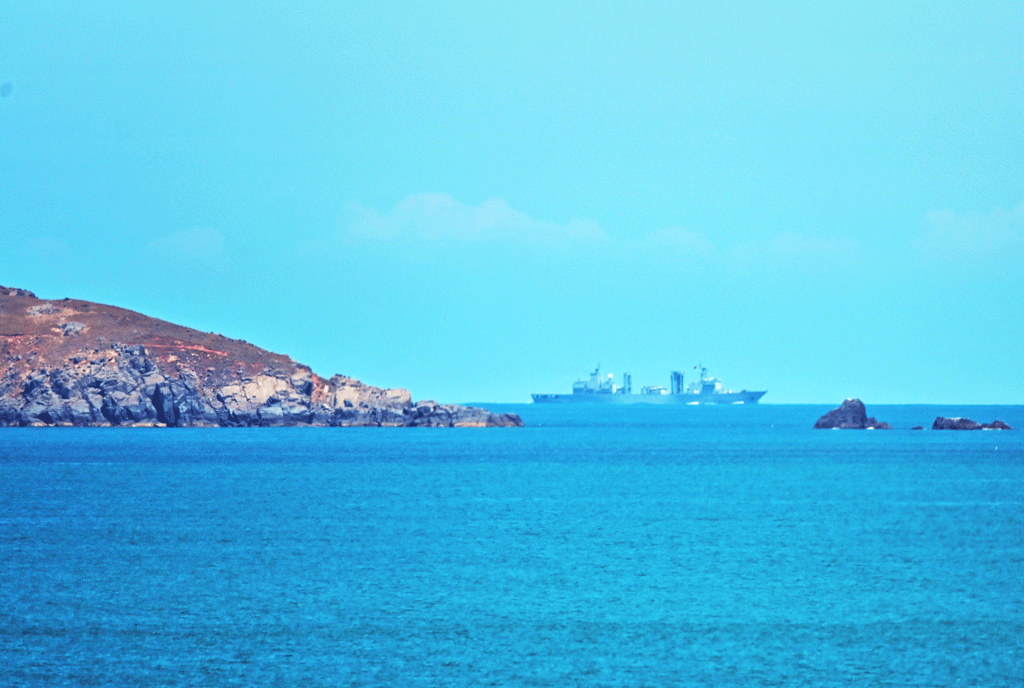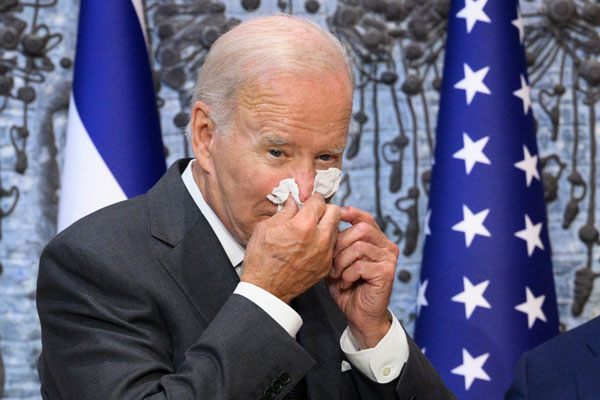Prime
Taiwan condemns 'evil neighbour' China over war drills

A Chinese military vessel sails off Pingtan island, one of mainland China's closest point from Taiwan, in Fujian province on August 5, 2022. PHOTO/AFP
What you need to know:
- The median line is an unofficial but once largely adhered-to border that runs down the middle of the Taiwan Strait, which separates Taiwan and China.
Taiwan blasted its "evil neighbour" on Friday after China encircled the island with a series of huge military drills that were condemned by the United States and other Western allies.
During military exercises on Thursday and Friday, China fired ballistic missiles and deployed fighter jets and warships around Taiwan.
The People's Liberation Army declared multiple no-go danger zones around Taiwan, straddling major shipping lanes in the world and at some points coming within 20 kilometres (12 miles) of the island's shores.
Beijing has said the exercises will continue until midday Sunday, and Taipei reported that Chinese fighter jets and ships crossed the "median line" that runs down the Taiwan Strait on Friday morning.
"As of 11 am, multiple batches of Chinese warplanes and warships conducted exercises around the Taiwan Strait and crossed the median line of the strait," Taipei's defence ministry said in a statement.
The median line is an unofficial but once largely adhered-to border that runs down the middle of the Taiwan Strait, which separates Taiwan and China.
Chinese incursions have become more common since Beijing declared in 2020 that the unofficial border no longer existed.
AFP journalists on the Chinese island of Pingtan saw a fighter jet flying overhead, prompting tourists to snap photos as it flew along the coast.
A Chinese military vessel was also visible sailing through the Taiwan Strait, they added.
Beijing has insisted its war games are a "necessary" response to US House Speaker Nancy Pelosi's visit to Taiwan, but Washington countered that China's leaders had "chosen to overreact".
Taiwan's premier Su Tseng-chang, meanwhile, called for allies to push for de-escalation.
"(We) didn't expect that the evil neighbour next door would show off its power at our door and arbitrarily jeopardise the busiest waterways in the world with its military exercises," he told reporters.
Pelosi has defended her trip to the self-ruled, democratic island, saying Friday that Washington would "not allow" China to isolate Taiwan.
"We have said from the start that our representation here is not about changing the status quo here in Asia, changing the status quo in Taiwan," she told reporters in Tokyo on the final leg of an Asia tour.
Later on Friday China hit back, announcing sanctions against Pelosi and her immediate family, without providing details on the punitive measures.
Beijing has in recent years sanctioned a number of US officials for what it views as acting against its core interests, and speaking out on human rights issues in Hong Kong and the northwestern region of Xinjiang.
Missiles over Taiwan
China's drills involved a "conventional missile firepower assault" in waters to the east of Taiwan, the Chinese military said.
The state-run Xinhua news agency said the Chinese military "flew more than 100 warplanes including fighters and bombers" during the exercises, as well as "over 10 destroyers and frigates".
State broadcaster CCTV reported that Chinese missiles had flown directly over Taiwan.
Japan also claimed that of the nine missiles it had detected, four were "believed to have flown over Taiwan's main island".
Taipei's military said it would not confirm missile flight paths, in a bid to protect its intelligence capabilities and not allow China "to intimidate us".
'Significant escalation'
China's ruling Communist Party views Taiwan as part of its territory and has vowed to one day take it, by force if necessary.
But the scale and intensity of the drills have triggered outrage in the United States and other democracies.
"These provocative actions are a significant escalation," Blinken said after talks with Southeast Asian foreign ministers in Phnom Penh.
"The fact is, the speaker's visit was peaceful. There is no justification for this extreme, disproportionate and escalatory military response," he added.
Japan lodged a formal diplomatic complaint against Beijing, with five of China's missiles believed to have landed in its exclusive economic zone.
And Australia -- which has a troubled relationship with China, its largest trading partner -- condemned the drills as "disproportionate and destabilising".
"Australia is deeply concerned about the launch of ballistic missiles by China into waters around Taiwan's coastline," foreign minister Penny Wong said.
The manoeuvres are taking place along some of the world's busiest shipping routes, used to disseminate the global supply of vital semiconductors and electronic equipment produced in East Asia.
"The shutting down of these transport routes -- even temporarily -- has consequences not only for Taiwan, but also trade flows tied to Japan and South Korea," Nick Marro, the Economist Intelligence Unit's lead analyst for global trade, wrote in a note.
Taiwan said the drills would disrupt 18 international routes passing through its flight information region while several airlines told AFP they would divert flights.
But markets in Taipei appeared to shrug off the tensions, with the Taiwan Taiex Shipping and Transportation Index, which tracks major shipping and airline stocks, up 3.7 percent Friday.
And analysts broadly agree that despite all its aggressive posturing, Beijing does not want an active military conflict against the United States and its allies over Taiwan -- just yet.
"The last thing Xi wants is an accidental war ignited," Titus Chen, an associate professor of political science at the National Sun Yat-Sen University in Taiwan, told AFP.





